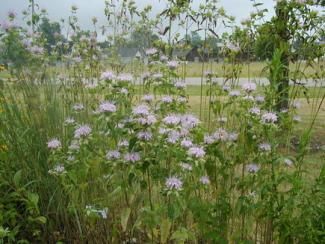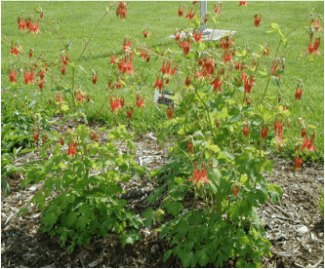
Native plants are adapted to Michigan's soils and climate, and they provide food and habitat for our native animals. Using native plants encourages a broad array of plants in the landscape, and since these plants are well-adapted to our local growing conditions, they require little or no special treatment after establishment. That means you save, time, money, water and sweat, so you can sit back and enjoy your landscape.
Pre-settlement Vegetation
Curious about what kind of plants were here in Washtenaw County before settlement took place? Look at the Presettlement Vegetation of Washtenaw County map.
Site Preparation Prior to Planting
Proper site preparation reduces competition by weeds and other plants for light, water and nutrients, helping assure better plant survival. Planting native plants into an area or garden bed that has been prepared by roto-tilling or treated with herbicide to kill existing vegetation is suggested.
Suggested Plant Spacing
Wildflowers tend to put on the most spectacular show when grouped together. Try planting multiple plants of the same species near one another. Space plants about 1-2 feet apart. If you are going to plant multiple species in one bed, consider placing the taller plants in the back and shorter ones toward the front of the bed.
Planting
Plants obtained from the Conservation District have been grown in paper tubes with an open bottom. Because of this, be sure to grasp each tube firmly with one hand, and place the other hand over the bottom of the tube when removing it from the bag or flat tray, so a minimal amount of soil will fall out and the plant will not slide out of the tube before planting.
- Plant as soon as possible after plants are received. Dig a hole approximately 6 " deep and slightly larger than the size of the tube (try using a bulb planter).
- Find the seam on the side of the paper tube and gently tear the tube open from bottom to top. DO NOT REMOVE THE PAPER TUBE AT THIS TIME! Set the tube with plant wrapped inside into the hole. Loosely fill the hole with soil and then grasp the paper tube at the top and gently slide the tube up and off of the plant. Firm soil around roots to eliminate air pockets. Planting is this fashion greatly reduces transplant shock.
- Watering plants may be necessary immediately after planting. As the season progresses, watering should only be used to supplement rainfall shortages. Fall plantings can be watered until frost, if rain is sparse.
- Mulching can be used to help reduce weed competition, conserve moisture, and for fall plantings, help plants over-winter and protect newly planted roots.
Maintenance
Native plants are hardy and will adapt to various site conditions, but growth can be enhanced using these maintenance suggestions.
- Remove unwanted weeds and apply additional mulch as needed.
- Watering after the year of establishment is not generally needed or suggested.
- Allow tops of plants to die back in the fall, then cut off the dead foliage. If you want the flowers to re-seed, when the plants have died back in the fall and gone to seed, mow the site, setting your mower blade high, then make several additional passes as needed, with the mower blade lower each time. This will clean-up the site and help re-seed the flowers.
- Fertilizing native plants is not generally recommended or needed.

Wild Columbine
Where to Purchase Native Plants:
Check out the following web sites for plant nurseries listings:
- See the Nurseries list at the latest Native Plant Expo & Marketplace!
- Huron River Watershed Council - Garden With Native Plants
- Wildflower Association of Michigan - Business Directory
- Washtenaw County Water Resources Commission - Plants for your Rain Garden
- Native Plant Guild - A network of Michigan Native Landscaping professionals & nurseries
- North Oakland WildOnes - Native Plant Nursery List
Native Plant Organizations & Volunteer Opportunities
- Seeds2Community - Hosts seasonal workshops on seed collection, stratification, and cultivation techniques foster both practical planting experience and a deeper understanding of local biodiversity. Workshops provide training and highly cost-effective way to cultivate your own plants from seed!
- Ann Arbor Area Wild Ones - Dedicated to educating and advocating for biodiversity throughout the Huron River Valley and surrounding areas.
- North Oakland Wild Ones - We serving Oakland County and the surrounding area in educating and promoting the benefit and use of Michigan native plants,
Native Plant Grants
- WCCD School & Community Habitat Grant and more info on the Applicant Resources
- Wildflower Association of Michigan - WAM Grants
- Pollinator Partnership Grants
Rain Gardens
A rain garden is designed to collect and absorb stormwater runoff from a roof, driveway or other impervious surface. Rain gardens are a formed from a shallow depression in the soil that is planted with native perennial plants. As stormwater runoff collects in the rain garden and is absorbed, pollutants and debris are filtered out, keeping them out of our streams, rivers and lakes. In addition, rain gardens can help reducing flooding, recharge the groundwater, and also look nice!
One inch of rainfall means 600 gallons of water can be captured by a typical rain garden. So by planting a rain garden, you can help solve some of our stormwater problems.
Rain Garden resources:
- Growing Native Plants that Butterflies and Moths Need - News article
- Rain Garden Manual for Homeowners
- Getting Help with Designing your Rain Garden
- Attracting Beneficial Insects to Gardens
- Master Rain Gardener Training, Washtenaw County Water Resource Commissioner's Office
- Rain Gardens of West Michigan
- City of Ann Arbor - “Stormwater Rates and Credits” for rain gardens.
Native Plant Resources
Check out the following web sites for additional information:
- Native Plant Selection & Care Guide (PDF)
- Native Plant Cultural Info - Photo Book (PDF)
- Native Plant Planting Guide (PDF)
- City of Ann Arbor, Natural Area Preservation Program.
- Ann Arbor Chapter of Wild Ones, a national non-profit organization that promotes the use of native plants in landscaping.
- USDA PLANTS Database
- Information on common native plant species from Ottawa County
Native Plant Educational Speaker Series Webinars
We've offered various seminars and webinars on native plant topics over the years, click below to watch them on YouTube!
Service Providers
Contact sources for wildflower & prairie grass seed, and prairie planting & restoration:
Grants for Plants!
Have a conservation project and looking for grant/funding resources?
We've compiled them for you in one place.


